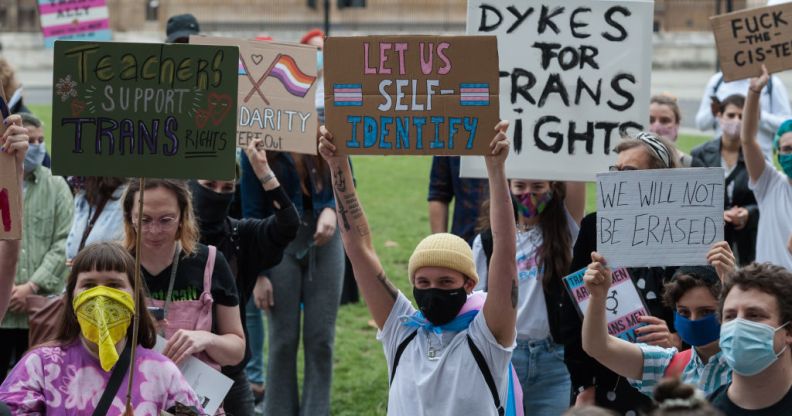Metropolitan Police face legal action after threatening to arrest and fine trans rights protesters

Trans people gathered in Parliament Square in London on July 4 (WIktor Szymanowicz/NurPhoto/Getty)
Trans people gathered in Parliament Square in London on July 4 (WIktor Szymanowicz/NurPhoto/Getty)
The Metropolitan Police is facing legal action after officers threatened to arrest and fine people at a trans rights protest, causing it to be cancelled.
The protest, organised by grassroots activist group Trans Rights Collective UK (TRCUK), was due to take place in Parliament Square on 5 September. It was called off at the last minute after organisers were told by police that participants would risk arrest for breaching “coronavirus law”.
At the time coronavirus laws allowed protests to take place if certain requirements had been met. TRCUK say they did meet all these requirements, and police had previously indicated the protest could go ahead.
“Despite holding a safe and peaceful protest in July and complying in full with all the police demands for this protest – which we strived to ensure was as COVID safe as possible during a global pandemic – we were halted at the eleventh hour,” said Rebeckah Turbett, TRCUK co-organiser and police liaison.
“This was both unlawful and yet again silenced marginalised voices which needed to be heard ahead of the government’s announcement on Gender Recognition Act reform.”
Lawyers acting on behalf of human rights group Liberty have now filed a pre-action letter to the force, alleging that the police threats of arrests and fines were unlawful as it breached the right to protest enshrined by the European Convention on Human Rights.
They further claim the Met’s actions were discriminatory because because other protests, including by Extinction Rebellion, were allowed to go ahead at a similar time with conditions.
“We will not allow police to curb the rights of individuals to protest against the decisions by the government which harm the physical and mental health of not only trans and non-binary people, but marginalised groups throughout the country,” Turbett said.
“We thank Liberty for all their help in ensuring this case be brought to justice.”
Metropolitan Police ‘misused’ coronavirus legislation against trans rights protesters.
TRCUK successfully liaised with the Met ahead of July’s trans rights protest which was held the same day fresh regulations came into force allowing gatherings to be held.
They maintained good relations after the event, and when Turbett thanked an officer for the force’s assistance they received the reply: “Hi Beckah, you are welcome. It was a good day and everyone kept safe. See you again.”
When organising the subsequent protest Turbett received an email from an officer effectively approving it, while noting that large gatherings breached COVID-19 legislation. “Breaches can result in fines and/or arrest,” it said.
But the day before the protest was due to take place, another officer allegedly telephoned Turbett asking them whether they knew they were breaching “coronavirus law” and could be arrested and fined, as could anyone assisting them, including volunteers.
Lana Adamou, a lawyer at Liberty, accused the Met of “over-zealous policing” and “misuse” of coronavirus legislation.
“Time and again it is the most marginalised who bear the brunt of over-zealous policing – making it even more important that their voices are heard,” she said. “This decision not only wrongly stopped advocates of trans rights from being heard, it also appears to have been discriminatory as other protests were allowed to go ahead.
“Protest is a core pillar of any healthy democracy which must be protected. At the time of this protest coronavirus legislation made specific provision for this, whatever the political cause being protested.
“People must not be criminalised en masse for voicing opposition to government action – even in the context of a pandemic. Police must facilitate our right to protest, not stand in our way.”

